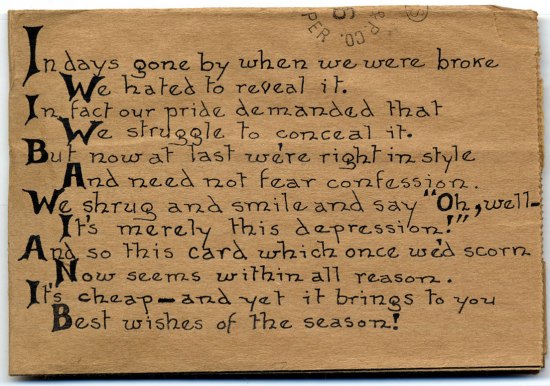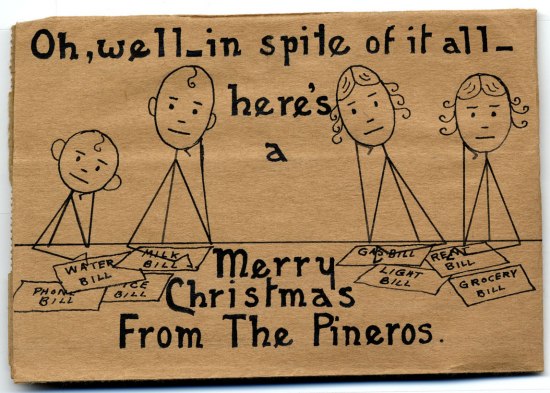
The Smithsonian sets the scene for this Christmas card despatched in 1933, a couple of years into the Nice Depression. They write:
In spite of the glum economic take a seatuation, the Pinero family used a brown paper bag to fashion an inexpensive holiday greeting card. They penned a suave rhyme and added some attractioning line drawings of Mother, Dad, and the children with the message: “Oh, smartly—despite all of it—right here’s a Merry Christmas from the Pineros.” On December 19, 1933, they mailed it from Chicacross to pals in Massachusetts, the usage of a one-and-a-half-cent stamp. For a minimal outlay of money, they have been in a position to keep up a correspondence with pals and comment on their lowered circumstances with wit and humor.
This hand-lettered poem is a prideful examinationple of sunshine verse, a whimsical type of poetry intended to go intotain or amuse, even though deal withing a serious subject in a humorous guyner. Within the poem, the Pineros suggest that they’d struggled economically for a while, however now, because of the continuing Depression, others shared their financial plight, which enabled them to be extra open and willdid about their take a seatuation.
Like many families, the Pineros probably had quite a lot of expenses for necessities including hire, groceries, utilities, milk, and ice. As a result of now not each family had electric refrigeration in 1933, many trusted regular deliveries of ice to stay their in line withishin a position meals chilly. Those expenses for milk and ice have been sepaprice; they weren’t a part of the grocery account. Native dairies supplied milk and other products on a daily foundation. Each the Ice Guy and the Milk Guy would cometh, so long as they have been paid!
It’s a historical case of when much less is certainly extra…
If you need to enroll in Open Tradition’s unfastened electronic mail newsletter, please to find it right here. Or follow our posts on Threads, Facebook, BlueSky or Mastodon.
If you need to support the mission of Open Culture, consider making a donation to our site. It’s onerous to depend 100% on advertisements, and your contributions will lend a hand us continue professionalviding the most efficient unfastened cultural and educational materials to be tolders eachthe place. You’ll contribute via PayBuddy, Patreon, and Venmo (@openculture). Thank you!
Related Content:
Behold! The Very First Christmas Card (1843)
When Salvador Dalí Created Christmas Playing cards That Have been Too Avant Garde for Corridormark (1960)
John Waters’ Hand-Made, Bizarreball Christmas Playing cards: 1964-Provide
Langston Hughes’ Housemade Christmas Playing cards From 1950
Salvador Dalí’s Avant-Garde Christmas Playing cards









